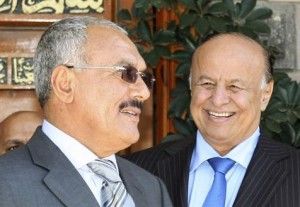Yemen's Veep Takes Power
Effective Saturday night, Yemeni Vice President Abed Rabbo Mansour Hadi took over Ali Abdullah Saleh's responsibilities as president, Yemeni government spokesman Abdu Ganadi told CNN.
The power transfer comes as a source close to the Saudi government said that the long-time Yemeni ruler arrived in Riyadh around midnight Saturday, a day after being hurt in an attack on a mosque in his palace.
Some Yemeni officials continue to insist that Saleh, who for months has resisted calls to step down, is still in Yemen. Yaser Yamani, Sanaa's deputy mayor, told Yemeni state TV Saturday night that "Saleh is still being treated in the military hospital in Sanaa."
Yet the Saudi source said that Saleh was immediately taken to a nearby hospital after his plane landed in Saudi Arabia.
A senior Yemeni government official had told CNN that Saleh was fine after sustaining a slight head injury in Friday's attack, and he gave a nationally broadcast speech later that night. But Saleh's medical condition is worse than originally thought, according to the Saudi source.
In response to that attack, Yemeni security forces on Friday pounded the home of Sadeq al-Ahmar, the tribal leader whose supporters are suspected of being behind the presidential palace offensive. The flurry of shelling left 10 people dead and 35 others wounded, according to Fawzi Al-Jaradi, an official with Hamil al-Ahmar, a Hashed tribal confederation led by Sadeq al-Ahmar.
The Saudi government source said Saturday that the Riyadh government has helped to broker an open-ended cease-fire aimed at ending spiralling violence in Yemen. Demonstrators have demanded Saleh's ouster for months, and fighting between Yemeni government forces and Hashed tribesemen has spiked considerably in recent weeks.


